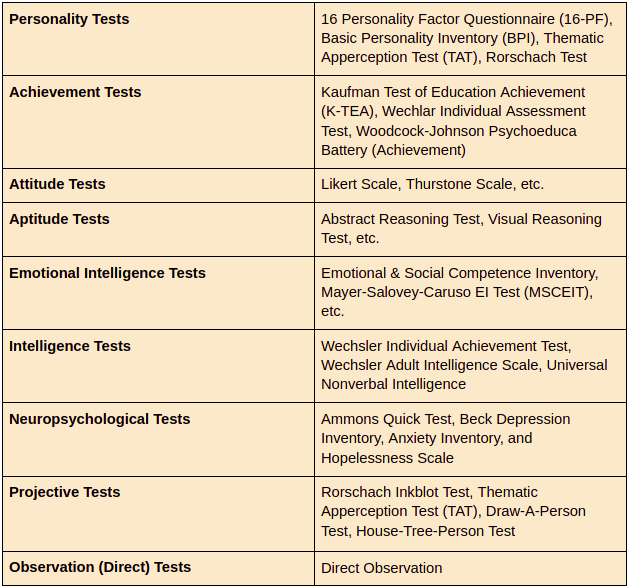Psychological tests (testing) are administered by psychologists, psychiatrists, and other mental health professionals. This article will provide an overview of the types of psychological tests, the procedure for taking them, what to do if you disagree with the results, and tips for handling the results.
Contents
Understanding Psychological Testing

Psychological testing is the administration of psychological tests. It is a process by which a person’s psychological characteristics are assessed. Thus, psychological tests are designed to measure an individual’s mental abilities, traits, and states.
Why It Is Done
Psychological testing is done for a variety of reasons.
It can help:
- diagnose mental disorders,
- assess cognitive functioning,
- identify areas of strengths and weaknesses, and
- measure changes in personality over time.
It can help:
- screen for mental health disorders,
- help guide treatment decisions, and
- track the progress of treatment.
By Whom It’s Administered
Psychological tests are usually administered by psychologists, psychiatrists, and other mental health professionals. However, they may also be administered by trained laypeople, such as school counselors, social workers, and human resource personnel.
What Is The Accuracy of Psychological Testing
The accuracy of psychological testing depends on several factors. For instance:
- the type of test being administered,
- the training and experience of the test administrator,
- the cooperation of the person being tested, and
- the standardization of the testing process.
Principles of Psychological Testing
There are four principles of psychological testing:
- Reliability is the consistency of a test’s results. A test is reliable if it produces similar results each time it is administered to the same person.
- Validity is the accuracy of a test’s results. A test is valid if it measures what it is supposed to measure.
- Objectivity is the impartiality of a test’s results. A test is objective if it is not influenced by the personal biases of the test administrator.
- Fairness is the equity of a test’s administration. A test is fair if it is administered in the same way to all people who take it.
Types of Tests

There are a variety of psychological tests that can help assess an individual’s mental abilities, traits, and states. However, some of the more common types of tests include:
- Intelligence Tests: Intelligence tests help measure an individual’s cognitive abilities. They tell us about both verbal and nonverbal intelligence.
- Achievement Tests: Achievement tests help measure an individual’s knowledge in a particular area. They can assess academic achievement or job-related skills.
- Aptitude Tests: Aptitude tests help predict an individual’s future performance in a particular area. They can assess academic aptitude or job-related potential.
- Personality Tests: Personality tests help assess an individual’s personality traits. They can identify areas of strengths and weaknesses, as well as diagnose mental disorders.
- Projective Tests: Projective tests help assess an individual’s innermost thoughts and feelings. They are tools to diagnose mental disorders, as well as to identify areas of strengths and weaknesses.
Taking Psychological Tests

If you have made up your mind to take a psychological test, it is important to ask the following questions:
- What is the purpose of the test?
- Who will be administering the test?
- Who will have access to the results?
- What are the risks and benefits of taking the test?
If you are not comfortable with the idea of taking a psychological test, you may want to consult with a mental health professional to discuss your concerns.
The Procedure for Taking Psychological Tests
The procedure for taking psychological tests varies depending on the type of test. For instance:
- Intelligence tests, achievement tests, and aptitude tests usually take place in a group setting.
- Personality tests, projective tests, and some intelligence tests may take place individually.
Steps Involved In Taking Tests
The administration of psychological tests typically involves the following steps. For instance:
- The test administrator will provide you with instructions on how to complete the test.
- You will have a set amount of time to complete the test.
- The test administrator will interpret your responses and provide you with a score.
Results and Interpretations
The results of psychological testing usually come in the form of a report. The report will typically include an interpretation of the test results, as well as recommendations for further action. These results can help diagnose mental disorders, identify areas of strengths and weaknesses, and guide treatment decisions. However, the interpretation of test results is a complex process, thus, a qualified mental health professional must interpret them.
Things To Keep In Mind
If you are going to take a psychological test, it is important to:
- Avoid guessing.
- Do not skip any items.
- Be honest in your responses.
- Do not change your answers.
- Read the instructions carefully.
- Follow the directions precisely.
- Be sure to answer all questions.
Giving Psychological Quiz Sample Questions
The following are sample questions that might expect in a psychological test.
For instance, what is your:
- name?
- date of birth?
- address?
- phone number?
- email address?
These questions assess basic information about the person taking the test.
For instance, what is your:
- favorite color?
- favorite food?
- interesting hobby?
These questions assess preferences and interests.
- What is your greatest fear?
- What is your worst memory?
These questions assess emotional stability.
- How do you usually spend your weekends?
- How do you usually spend your evenings?
These questions assess lifestyle and leisure activities.
- What is your greatest achievement?
- What is your biggest failure?
These questions assess success and motivation.
- If you could have any job in the world, what would it be?
These questions assess vocational interests.
- What is your opinion of taking risks?
- Do you like spending time with people or being alone?
These questions assess personality traits.
Handling the Results of Psychological Testing

The results of psychological testing can be at times confusing and overwhelming. So, if you have any questions about the results of your test, it is important to consult with a qualified mental health professional. As they will be able to explain the results of your test in a way that is easy to understand.
If You Disagree With The Results
It is not uncommon for people to disagree with the results of their psychological testing. If you feel that the results of your test do not accurately reflect who you are, there are a few things that you can do:
- Request a copy of your test results.
- Review the interpretation of your results.
- Discuss your concerns with a mental health professional.
They will be able to help you understand the results of your test and how they can help improve your life. In addition, you have the right to request a re-evaluation. Thus, you should consult with a mental health professional to discuss your concerns and determine if you can go for a re-evaluation.
Tips for Dealing With the Results
The following are some tips for dealing with the results of psychological testing:
- Try to keep an open mind about the results of your test.
- Do not let the results of your test define you as a person.
- Use the results of your test as a starting point for change.
- Remember that the results of your test are just one part of who you are.
Moreover, you must not let results bog you down. Maybe work with a qualified mental health professional to understand the results of your test and how to use them to improve your life.
Conclusion
Psychological testing can be a valuable tool for diagnosis and treatment. If you are going to take a psychological test, it is important, to be honest in your responses and follow the directions carefully. However, if you are not comfortable with the idea of taking a psychological test, you may want to consult with a mental health professional to discuss your concerns.
A Word From Therapy Mantra
Your mental health — Your psychological, emotional, and social well-being — has an impact on every aspect of your life. Positive mental health essentially allows you to effectively deal with life’s everyday challenges.
At TherapyMantra, we have a team of therapists who provide affordable online therapy to assist you with issues such as depression, anxiety, stress, workplace Issues, addiction, relationship, OCD, LGBTQ, and PTSD. You can book a free therapy or download our free Android or iOS app.


